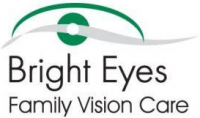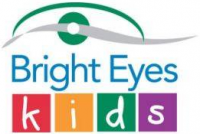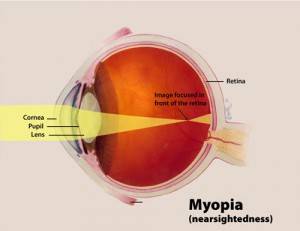Understanding Myopia
Myopia, or nearsightedness is a very common vision problem. It's estimated that more than one-third of Americans are nearsighted, and it is increasing. Nearsighted people have difficulty reading road signs and seeing distant objects clearly, but can see well for up-close tasks such as reading or sewing. If your glasses or contact lens prescription begins with minus numbers, like -2.50, you are nearsighted.
 Myopia Control FAQ
Myopia Control FAQ
Does my child need to have a general eye exam before starting Myopia Control?
Yes, a comprehensive eye exam from an eye doctor is required. We would be happy to provide that exam. However, if your child has had an eye exam with another eye doctor within the last year, you can request that doctor refer your child to our office for Myopia Control.
Is there any additional charge for the Myopia Control procedures?
Yes, standard optometric charges apply. We offer several different year-long programs. Following the comprehensive eye exam, a Myopia Control Consult is necessary to determine which program is best for your child.
Can I request to see either doctor?
Either Dr. Nate or Dr. Beth can discuss Myopia Control at your child’s comprehensive eye exam. After that, Dr. Nate performs the Myopia Control Consult and the Myopia Control treatment visits.
What techniques are used in the Myopia Control Program?
There are three options:
- Orthokeratology (corneal reshaping) is the wearing of special contact lenses at night to provide clear vision during the day without lenses.
- Multifocal soft contact lenses are worn during the day.
- Atropine, in the form of eye drops, is used at night time.
Every patient is different – one treatment does not work for all patients. That is why a specialized Myopia Control Consult is necessary before selecting the best treatment method.
How do I get an appointment at Bright Eyes?
You can request an appointment here or call us at 813-792-0637. Be sure to specify that you are interested in Myopia Control so the Bright Eyes staff can book the appropriate appointment for your child.
Do I need to bring anything to the appointment?
Just the patient. 🙂 Bringing previous eye exam history or old glasses can also be helpful at the initial appointment.
Will Myopia Control require many office visits?
There are multiple office visits as the treatment is begun. After that, there are quarterly (every three months) follow up visits to ensure that all is going well for your child.
Will Myopia Control hurt?
No! If your child is new to contact lenses or eye drops, sometimes there can be discomfort while he gets used them, but we use the latest technology to ensure quick adaptation.
I am nearsighted and my child is nearsighted, too, and it’s getting worse. Is there anything I can do for them?
Probably! More children than ever are becoming nearsighted (myopic). Fortunately, there different options to help children of any age.
My eye doctor told me that myopia is in my genes, and that there is no way to slow or stop it. Is there scientific evidence that this really works?
For years, many doctors thought that myopia is caused only by genetics, but in the last 10 years or so, there has been very dramatic research that has shown this to be not the case. Take a look at the research section below to see some of these studies.
Are there vitamins that my child should be taking to keep his vision from getting worse?
No. At this time, there are no studies that show benefits of taking vitamins. However, it is a good idea in general to maintain a healthy diet including more vegetables and less sugar. Talk to your pediatrician for specific information on nutrition.
What about eye exercises?
There are some specific cases where vision therapy (sometimes called eye exercises) may reverse mild nearsightedness due to eyestrain. This is often called “pseudo-myopia”. However, true nearsightedness cannot be reversed or eliminated with eye exercises. A comprehensive eye exam with a doctor trained in children’s vision is necessary to tell the difference.
My child is only 8 years old. Is really OK for them to do Myopia Control? Even if it involves contact lenses?
Yes! It used to be thought that children should not use contact lenses until they were teenagers. Several studies have shown that contact lenses are safe for younger children as long as they are taught proper care of the contact lenses. Also, contact lens materials and designs are safer than ever for all patients.
Does Myopia Control have FDA approval?
No. As of right now, the treatment options that exist for myopia control are FDA approved procedures, but are not specially approved for myopia progression. For example, orthokeratology was FDA approved for the temporary treatment of blurry vision due to myopia, but treatment for Myopia Control is considered “off-label”. The same is true for atropine and multifocal contact lenses. However, this is changing. Recently a meeting was held between the American Academy of Ophthalmology (AAO), American Academy of Optometry (AAOpt), American Association for Pediatric Ophthalmology and Strabismus (AAPOS) and more to establish an FDA study for myopia control.
Do only optometrists offer Myopia Control?
No, both ophthalmologists (MDs) and optometrists (ODs) offer myopia control. Bruce Koffler, MD, an ophthalmologist wrote this important document called “The Case for Myopia Control Now.” You can find doctors all over the whole who provide this service via the American Academy of Orthokeratology and Myopia Control.
Myopia Control Scientific Research
Below is just a small sampling of scientific research supporting myopia control. If you’d like to see more, go to http://myopiaprevention.org.
Increasing Prevalence of Myopia
- Vitale S, Sperduto RD, Ferris FL 3rd. Increased prevalence of myopia in the United States between 1971-1972 and 1999-2004. Arch Ophthalmol. 2009;127(12):1632-9.
- Neil Charman.(2010)Myopia: its prevalence, origins and control. Ophthalmic and Physiological OpticsVolume 31, Issue 1, pages 3–6, January 2011 (FULL TEXT) doi: 10.1111/j.1475-1313.2010.00808.x
- Seang-Mei Saw, Gus Gazzard, Edwin Chan Shih-Yen, Wei-Han Chua. (2005)Myopia and associated pathological complications. (FULL TEXT) Ophthalmic Physiol Opt. 25(5): 381-91 DOI: 10.1111/j.1475-1313.2005.00298.x
Development of Myopia
- Xiang F, He M, Morgan IG. The impact of parental myopia on myopia in Chinese children:population-based evidence. Optom Vis Sci. 2012 Oct;89(10):1487-96.
- Morgan IG, Ohno-Matsui K, Saw SM. Myopia. Lancet. 2012 May 5;379(9827):1739-48.
- Smith EL 3rd, Hung LF, Huang J. Relative peripheral hyperopic defocus alters central refractive development in infant monkeys. Vision Res. 2009 Sep;49(19):2386-92.
Risks of Myopia
- Klaver CW, et al “Association of axial length with risk of uncorrectable visual impairment for europeans with myopia” JAMA Ophthalmol 2016; DOI: 10.1001/jamaophthalmol.2016.4009.
- DANDONA, Rakhi and DANDONA, Lalit. Refractive error blindness. Bull World Health Organ [online]. 2001, vol.79, n.3
- Paul Mitchell, et al., The relationship between glaucoma and myopia: The blue mountains eye study, Volume 106, Issue 10, 1 October 1999, Pages 2010–2015
Myopia Control Options
- Walline JJ, Lindsley K, Vedula SS, et al. Interventions to slow progression of myopia in children. Cochrane Database Syst Rev.2011 Dec 7;(12):CD004916. doi: 10.1002/14651858.CD004916.pub3.
- Cho P, Cheung SW, Edwards M. The longitudinal orthokeratology research in children (LORIC) in Hong Kong: a pilot study on refractive changes and myopic control. Curr Eye Res. 2005 Jan;30(1):71-80.
- Walline JJ, Rah MJ, Jones LA. The Children’s Overnight Orthokeratology Investigation (COOKI) pilot study. Optom Vis Sci. 2004 Jun;81(6):407-13.
- Eiden SB, Davis RL, Bennett ES, DeKinder JO. The SMART study: background, rationale, and baseline results. Contact Lens Spectrum. 2009 Oct.
- Kakita T, Hiraoka T, Oshika T. Influence of overnight orthokeratology on axial elongation in childhood myopia. Invest Ophthalmol Vis Sci. 2011 Apr 6;52(5):2170-4.
- Carly Siu Yin Lam, Wing Chun Tang, Dennis Yan-Yin Tse, Ying Yung Tang, Chi Ho To. (2014)Defocus Incorporated Soft Contact (DISC) lens slows myopia progression in Hong Kong Chinese schoolchildren: a 2-year randomised clinical trial. (FULL TEXT) British Journal of Ophthalmology VOL 98 PG 40-45
- Audrey Chia, Qing-Shu Lu, Donald Tan. (2015)Five-Year Clinical Trial on Atropine for the Treatment of Myopia 2. (ABSTRACT) Ophthalmology Published Online August 11, 2015. Accessed 8/30/2015; doi: org/10.1016/j.ophtha.2015.07.004



